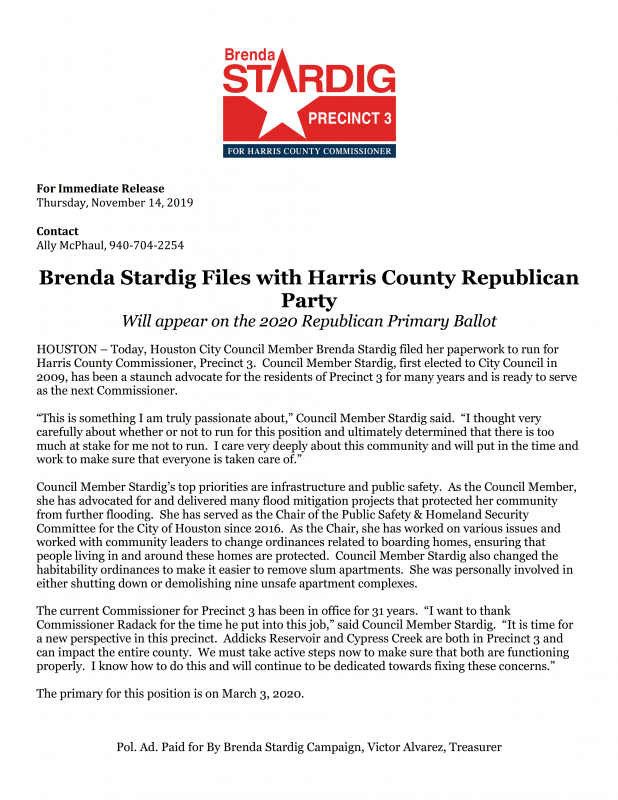Primary elections are less than a month off, and the party is going to have to choose whether to stick with Simpson or go another route. In the past I’ve voted both for and against Simpson, and am currently undecided on what to do this year. While countywide elections, save perhaps district attorney, are likely to be a wipe out again the election has enough races that will be close enough that prudent action by HCRP could make a difference.
David wrote a great piece about the County Chair race. While it’s hard to argue with the logic he uses does the special election result teach us about how a different path forward could lead to different results? I would argue it does, and that until Simpson, or a successor, treads the new path that the county is going to be in an ever deepening blue ocean.
Looking at historical data for HD 148 shows the following results:
2020 special election – DEM 65.47 REP 34.53 (D+30.94)
2018 – DEM 67.91 REP 32.09 (D+35.82)
2016 – Uncontested
2014 – DEM 60.29 REP 39.71 (D+20.58)
2012 – No republican
2010 – DEM 58.68 REP 41.32 (D+17.36)
With 2016 uncontested we can’t assess how much is a response to Trump and/or Beto-mania in 2018. However, we can look at a random county wide race to glean that data. Using the top Judicial District race on the ballot shows the following results:
2018 – DEM 54.78 REP 45.22 (D+9.56)
2016 – DEM 52.42 REP 47.58 (D+4.84)
2014 – DEM 45.71 REP 53.55 (D-7.84)
Comparing HD 148 to the top judicial race shows a 2014 to 2018 difference of:
Judicial District DEM+17.4
HD 148 DEM+15.24
With the two values similar, it looks like Trump/Beto accounted for roughly a 16 point swing, and less reliably one could use the 2016 results to argue that Trump is 72.8% of the swing and Beto the other 27.2% of the swing. If we apply the those modifiers to HD 148 that would give a predicted DEM vote in the 2020 runoff election as DEM+ (20.58+(0.72*16)) = DEM +32.1. This is in line with the actual results, especially considering the incumbent was not running for reelection, and the special election having a low turnout.
Luis LaRotta’s team did as best as they could in the election. Not only were they active campaigning, but they had a bevy of endorsements. It didn’t move the needle. That tells us that continuing with the same path forward campaigning wise is not going to be effective. So what can HCRP learn from the election and how can they do better?
If the goal of the county party is to organize the party then we shouldn’t expect to prevail in the close races. The county party apparatus has to adapt if we are to succeed in the future. The saying that the county party can have principles or money but not both has to be looked at differently to move forward. The county party needs both; finances to be able to fund operations, and principles to motivate volunteers to come out and participate.
To that end, HCRP needs to do two things. One, they have to make a concerted effort to call out and end fighting over any self proclaimed dichotomy within the party. I’ve long beat the drum of the party being stronger when it is a big tent, and that needs to be a priority for the HCRP. It’s okay to disagree with the Log Cabin Republicans on things like the various bathroom bills, but still cooperate with them where there is common ground. Working together where we agree not only achieves more, but it also creates the goodwill needed to smooth over the tensions that come where there is disagreement.
Second, HCRP needs to make a conscious decision that organization isn’t as important as candidate support. An organized and hard working HD 148 campaign didn’t achieve anything other than what was expected. HCRP needs to decide they are going to play an active support role to the candidates, but take the lead from the candidates on how to win the race. Winning in Sarah Davis’ district is a distinctly different task than winning in Briscoe Cain’s district. Rather than try to impose some uniformity in action HCRP is better advised to imposing a commitment to help the candidate win how the candidate plans on winning. The ground game is ultimately the candidate’s responsibility. HCRP needs to assist, not try to lead, in such efforts. Facilitate volunteers and communication with the candidate, and then get out of the way and stand at the ready to assist as requested.
The road to countywide victory isn’t found in countywide campaigns. The road to victory is found in district by district campaigns that move the needle in ways appropriate to the specific districts. Retaking some of the close seats lost two years ago gives the mouthpiece needed to propagate the republican message. A focus on assisting those candidates, in ways the candidates believe is best suited to the district, is the lesson that needs to be learned from the special election.


